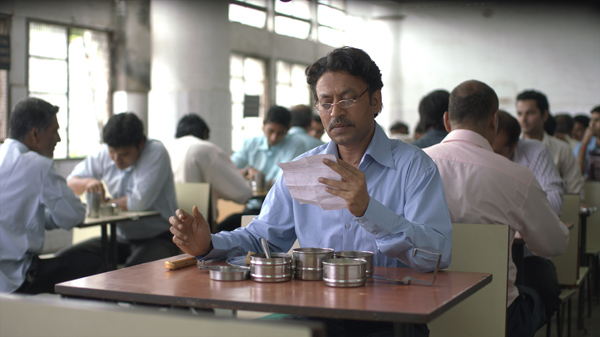![]() Writer/director Ritesh Batra’s debut feature, The Lunchbox, was originally conceived as a documentary about Mumbai’s Dabbawallahs —a community of 5000 dabba (lunchbox) deliverymen who, in a tradition stretching back 120 years, daily deliver home-cooked meals from housewives to their husbands’ offices and then return the empty boxes. The illiterate Dabbawallahs navigate through the bustling transit system and the labyrinth of streets, relying on a complicated coding system of colors and symbols. A Harvard University study concluded that just one in a million lunchboxes is delivered to the wrong address.
Writer/director Ritesh Batra’s debut feature, The Lunchbox, was originally conceived as a documentary about Mumbai’s Dabbawallahs —a community of 5000 dabba (lunchbox) deliverymen who, in a tradition stretching back 120 years, daily deliver home-cooked meals from housewives to their husbands’ offices and then return the empty boxes. The illiterate Dabbawallahs navigate through the bustling transit system and the labyrinth of streets, relying on a complicated coding system of colors and symbols. A Harvard University study concluded that just one in a million lunchboxes is delivered to the wrong address.
Batra tells the extraordinary story of that one lunchbox and the ordinary lives of the strangers that connect across age, sex, class, and religion. In a conservative, middle-class Hindu enclave, Ila (Nimrat Kaur), a young neglected housewife and mother, lovingly prepares lunch for her distant husband. She’s determined that the way to his heart is through his stomach, and she takes culinary and relationship advice from her housebound neighbor, who lives upstairs in the cramped block of flats. Government accountant, Saajan (Irrfan Khan), a stern, lonely widower from an old Christian neighborhood, devours the lunch in error, surprised at the improvement of the restaurant that usually delivers to him. When Ila’s questions her husband’s appreciation of his lunch, she realizes that a mistake has happened, and the next day Ila sends a short note with the lunch.
With his retirement drawing close, Saajan faces an uncertain and isolated future. When he is asked to train his successor, the indomitably enthusiastic orphan Shaikh (Nawazuddin Siddiqui), Saajan is ambivalent. As Ila continues the lunch deliveries, Saajan begins a daily exchange with the mystery woman pouring her heart into cooking for him. Ila and Saajan open up to each other, sharing their daily lives, memories, and hopes for the future. With Saajan’s retirement looming, Ila’s realizes that they will have to have courage to turn fantasies into reality.
The Lunchbox is superbly directed by Batra. Rather than the exaggerated Slumdog Millionaire treatment that exploited Mumbai’s poverty for Western audiences or the fantastical Bollywood portrayal, Batra’s depiction of the city is naturalistic and extraordinary, from the chaos of the transport networks to the chain of command of the Dabbawallahs.
Batra’s bittersweet script is all about characters that you can relate to no matter where you’re from, and he has elicited beautiful economical performances. Khan (also seen in Life of Pi and Slumdog Millionaire) does a fantastic job as the dour Saajan confronts his past and the uncertainties of the future, and Kaur delivers a wonderful, disarmingly natural and nuanced performance as the neglected, grieving wife.
The pathos of these two principal characters is balanced with comedic contrast and touches of the supporting cast. Siddiqui is wonderful as Shaikh, a thick-skinned optimist, eager to excel and provide for his wife. Bharati Achrekar lends her vocal talents as Ila’s opinionated and forthright elderly confidante, the auntie upstairs who we never see.
Batra emphasizes the value of the written word and intimate communication in our age of instant messaging, email, and social media. Neither Ila nor Saajan have a mobile phone, while in contrast, Ila’s husband, who does, is too absorbed in it to even register his family. The audience is subtly nudged to think about the pleasures we have so quickly lost.
If you are used to having all the pieces neatly fit together, the ending may thwart expectations. Shaikh delivers a simple line that captures the film’s essence beautifully: “Sometimes even the wrong train can take you to the right destination.” It nicely sums up the film’s unique premise and helps to interpret its ending.
Economically produced, told and sumptuously shot, The Lunchbox has been richly praised. It won the Audience Choice Award at the 2013 Cannes Film Festival’s Critics Week, among many other honors. It is a charming, poignant, and heartwarming tale that is a breath of fresh air amidst other Indian film excesses. A must-watch on a full stomach!

















Leave A Comment